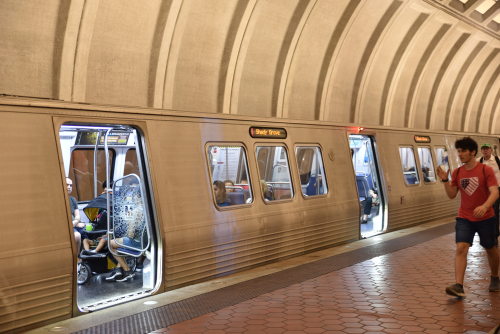
An additional $50 million in federal funding directed to the Washington Metropolitan Area Transit Authority’s annual operating costs would make the federal government pay its share for a transportation system its workers use every day, lawmakers said this week during a congressional hearing.
The U.S. House Committee on Oversight and Reform’s Government Operations Subcommittee on Oct. 23 held a hearing entitled, “Metro: Report Card for America’s Subway” to examine the WMATA’s funding, oversight, and reform efforts. WMATA is a $40 billion transit system that covers the Metrorail system, the Metrobus system and MetroAccess a paratransit system. Of the roughly 1 million passengers a day who use WMATA, roughly a third are federal workers, and the system supports the many tourists who visit the nation’s capital, as well.
Metrorail, or the Metro, has six lines, 91 stations and over 117 miles of track. In 2016, the Metro made nearly 180 million trips. Metrobus consists of 1,505 buses covering an area of more than 1,500 square miles in D.C., Maryland and Virginia. An estimated 270 bus routes serving more than 11,100 stops provides more than 400,000 trips per day during the week.
WMATA has a nearly $2 billion annual operating budget, CEO and General Manager Paul Wiedefeld said, which is funded entirely by the combination of state and local funds from the District of Columbia, Virginia and Maryland, but no federal funds.
The capital budget for fiscal year 2020 is just over $1.7 billion, with federal funds accounting for $500 million. In FY 2019, 99 percent of the $1.5 billion budget was delivered, in contrast to four years ago when the authority was investing roughly 65 percent of what was requested, Wiedefeld added.
Committee Chairman Gerry Connolly (D-VA), said his proposed bill, the Metro Accountability and Investment Act (MAIA), H.R. 2520, would provide the system with $150 million for capital funding each year for 10 years. In addition, under the bill, the federal government would for the first time provide WMATA an additional $50 million in annual operating budget funds, with $10 million of that money going to the transit system’s Office of Inspector General.
The MAIA would require local jurisdictions to uphold their funding promises, as well as require WMATA to grant the Office of Inspector General within the system full autonomy.
“This would be a down payment on the federal government being a full partner at the table,” Connolly said. “We cannot afford a death spiral of disinvestment and declining service for a transit system that gets our federal workforce to work every day, and that serves the tens of millions of Americans and non-Americans that visit our capital each year.”
Establishing independence for the inspector general was a concern of committee members following the resignation of former chairman of the board for WMATA Jack Evans. Evans resigned after a 20-page confidential memo from the law firm the board hired to investigate Evans alleged ethics violations leaked to The Washington Post. In the memo, the firm found that Evans had “knowingly” violated ethical standards.
Committee members asked what changes had taken place within the transit authority’s board since Evans’ resignation.
New board Chairman Paul Smedberg said the board had instituted new policies to provide for transparent actions, as well as policies covering ethics violations by board members.
Other committee members were more concerned with the possibility of a cybersecurity breach within the system brought about by WMATA’s pending purchase of nearly 800 railcars from China.
U.S. Rep. Eleanor Holmes Norton (D-DC), asked if WMATA’s inspector general was as concerned as some members of Congress.
“We are concerned it would give an avenue of espionage into our transit system,” she said. “Many of our security experts come to work every day on our transit system. Does the purchase of Chinese railcars present a concern to you or to anyone you know of?”
WMATA Inspector General Geoffrey Cherrington said the purchase was not yet complete and that he had raised the alarm bells about the railcars’ origins.
“I can’t tell Metro what to buy and where to buy it, but I’ve raised the red flag,” Cherrington said. “The company that sells them undercuts all the competitors in the United States and around the world, and we believe they do that for a reason. We believe that when a subway system runs under something critical, particularly like the nation’s capital, the seat of power in the world and all the targets here, we have concerns that it can be controlled by a third party or outside of the Metro system. We can’t state that it would be, but we can state that it might be… And we’ve raised the alarm bells about that.”
U.S. Rep. Jennifer Wexton (D-VA) asked about fare increases, particularly concerning how they might impact riders in her district who already pay the maximum fares.
Wiedefeld said that WMATA was looking at fare increases, as it does every two years, but that the system will be also be looking at extra revenue streams through advertising, station naming opportunities and parking passes, among other additional revenue options.
U.S. Rep. Glenn Grothman (R-WI) questioned whether the recent decision to decriminalize fare evasion was a good idea given that it was projected to cost the system $36 million per year.
Wiedefeld said the decision to decriminalize was not one WMATA was in favor of, but was a decision made by the District of Columbia in order to make laws the same in the district as they are in surrounding counties and states.